
by Gideon Marcus
President Johnson commissioned noted (and favorite of our editor, Janice) artist Peter Hurd to draw his official Presidential portrait. This was the result:

Reportedly, upon seeing the painting, Johnson described it as the ugliest thing he had ever seen. Aghast, the artist asked what the President had wanted in a portrait. Lyndon whipped out this piece painted by Normal Rockwell:
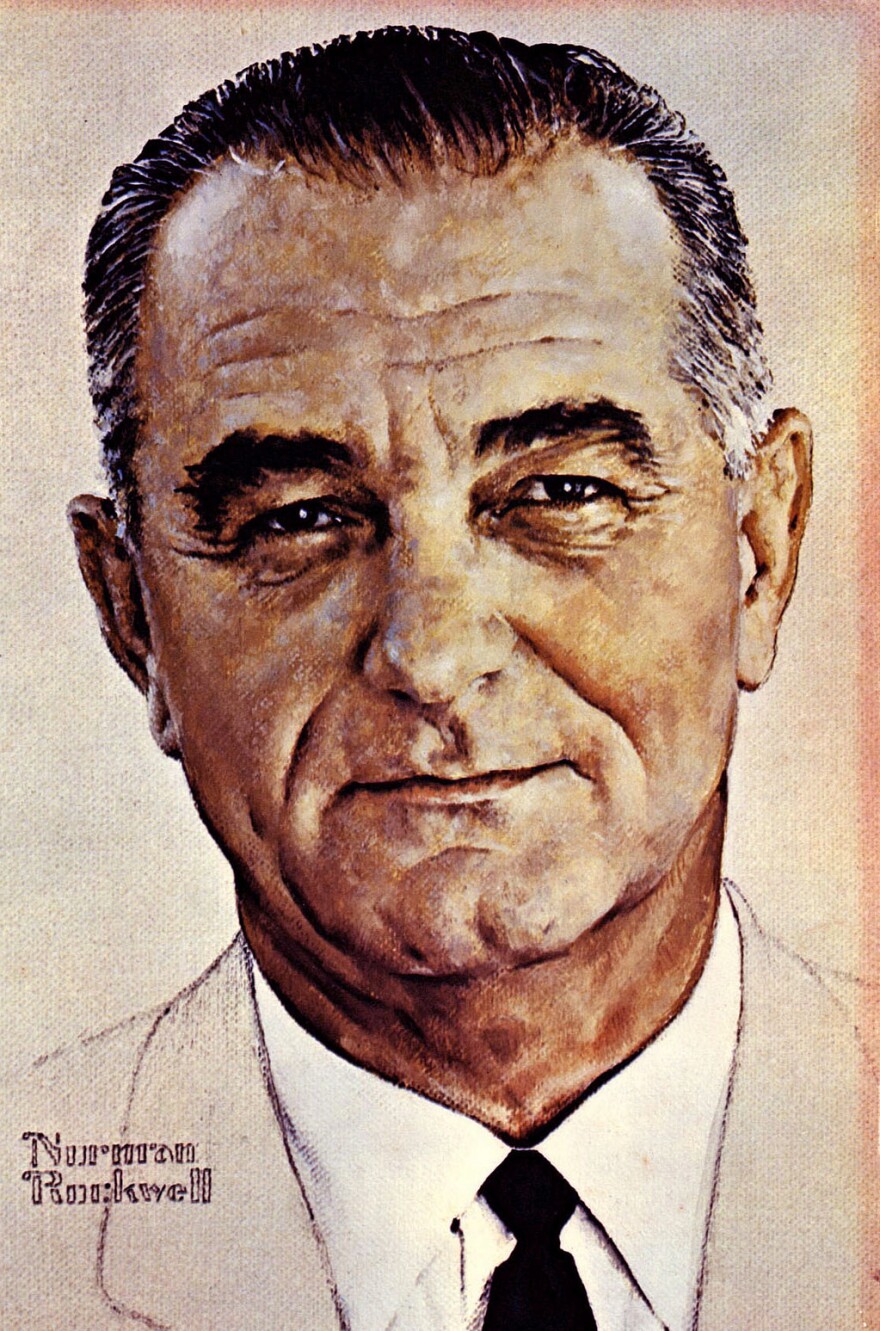
I understand that Hurd returned his commission and that a new picture will be made. Maybe by someone with the initials L.B.J.
Law of Analogy
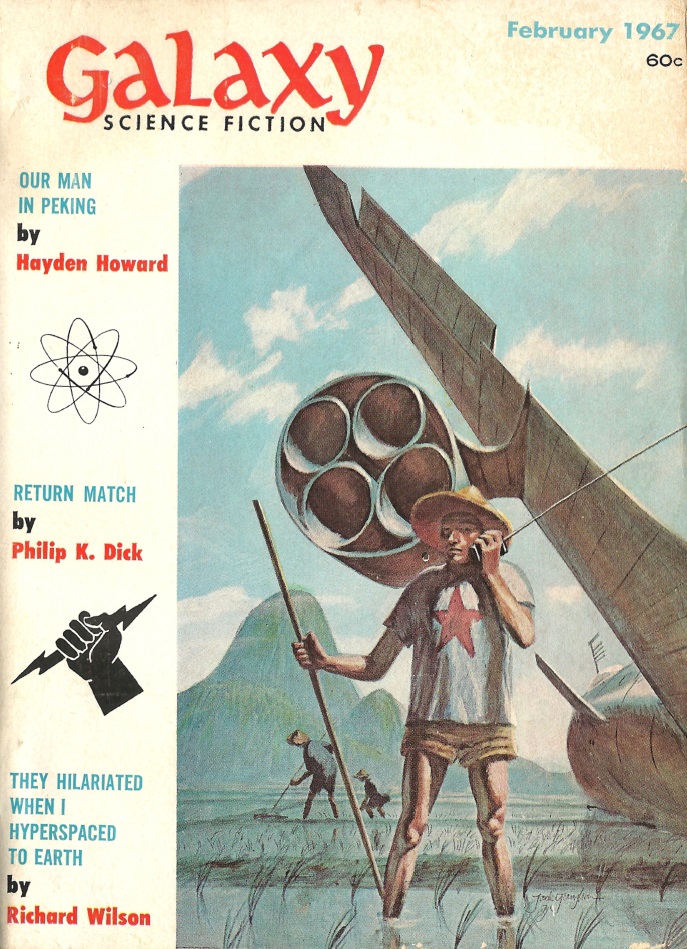
by Jack Gaughan
It was certainly a blow to the shocked Hurd, but I kind of know how Lyndon felt. I had a similar reaction upon finising the latest issue of Galaxy. This was, for the most part, not the magazine I was hoping for.
Our Man in Peking, by Hayden Howard

by Jack Gaughan
Yes, as Winter follows Fall, so we have yet another tale in the saga of Dr. West and the half-alien Esks. Briefly: an alien came to Earth and bred with a local woman. Her progeny, and their kids, too, all breed humanoids who look like Eskimos, but who mature in three years and give birth in a month. Twenty years after the first was born, there are now more than a billion of them. And instead of being stopped or even investigated to any real degree, the governments of the world refuse to see them as anything other than mutant Eskimos, deserving of love, affection, and free food. The Chinese have welcomed them with open arms to till hitherto unprofitable fields, but Canada, Scandinavia, and other places have also taken them in.
Only one man, the notorious Dr. West, who tried but failed to sterilize the Esks with a tailored plague, will admit the true menace of the Esks.
Last installment, West was in a comfy Canadian prison for his attempted genocide. In this one, he has been sent on a mission to Red China, brainwashed to learn the details on an as-needed basis, mind-controlled to have no say in his actions. He is shot down over the mainland along with an Air Force Major so caricatured in his manner that I wondered if Gaughan's art would depict him with straw coming out of his joints.
After much rigamarole, West finds himself in the presence of the current Communist leader, Mao III (do the Chinese give descendants appellations like that?) And then the true nature of West's mission is revealed…
Hayden Howard really isn't a very good writer, and there aren't actually any characters in this story–only marionettes who dance to the author's strings without any will of their own. I also could have done without the word "Chink" used a couple dozen times.
What keeps the tale from getting just one star is this morbid fascination with how this wholly unrealistic scenario will turn out. We're supposed to get the conclusion next month. God willing, that'll be the end of the Esks, one way or another.
Two stars.
Return Match, by Philip K. Dick
The outspacers have gambling casinos across the galaxy. The only problem? They tend to be lethal for their patrons. Joseph Tinbane, a cop for Superior Los Angeles, takes on the aliens' latest contraption: a pinball machine that evolves not only to be unbeatable, but ultimately to attack the player!
Dick's vivid writing is on display here, so there's nothing wrong with the reading. But the concept is pure fantasy, up to and including the conclusion where Tinbane is menaced by giant pinballs. I can only imagine that PKD turned on, dropped out, and dashed off this tale before the hallucinations disappeared from his memory.
Three stars.
For Your Information: Who Invented the Crossbow? by Willy Ley
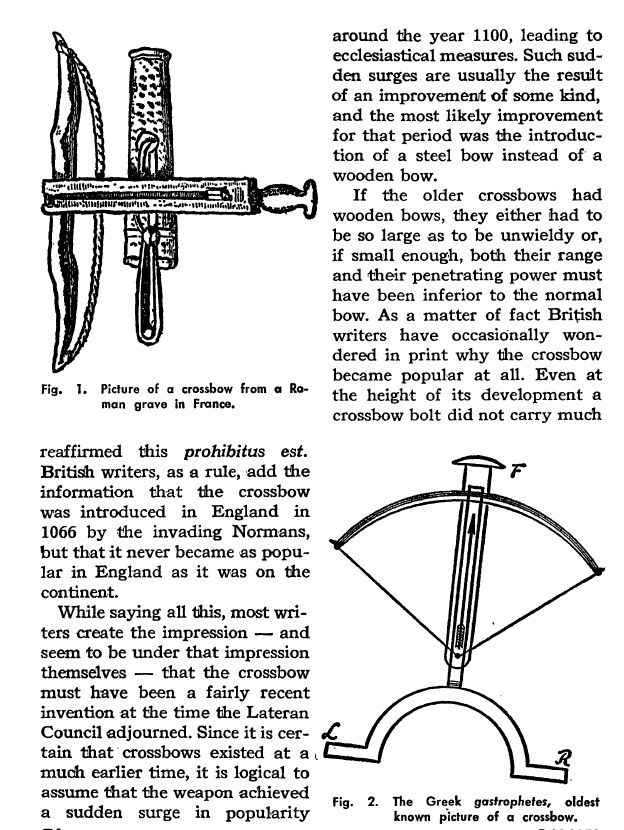
Ley's latest piece is an interesting, but somehow perfunctory piece on the evolution of the crossbow. A few more pages of Asimov treatment would have helped.
Three stars.
The Last Filibuster, by Wallace West
War between North and South America is averted when the governments of both nations are captured and impressed to do the fighting.
I like the sentiment: politicians would be a lot less willing to send their sons (and daughters) to war if their lives were on the line. But the story is just sort of silly and obvious.
Besides, who could believe that an armed mob could invade the Capitol to kidnap Congress? It beggars the imagination.
Two stars.
They Hilariated When I Hyperspaced For Earth, by Richard Wilson
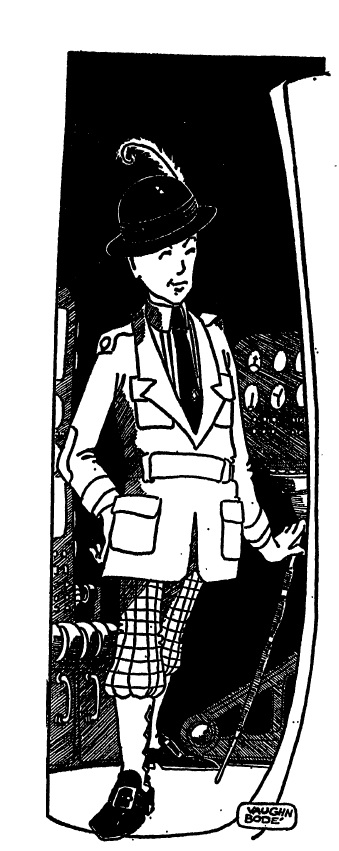
by Vaughn Bodé
The leader of a boring world that has stalled in its progressive mediocrity comes to Earth to steal our Secretary General, an efficient Ugandan who knows how to get things done. A lot of "comedy" ensues.
Not only is the story a bore, but I can't forgive it for getting "They all Laughed" stuck in my head.
Two stars.
The Trojan Bombardment, by Christopher Anvil
How we defeat an enemy without firing a shot? Why by shooting shells filled with booze, cigarettes, and sexy ladies at them! After all, that's what they're really fighting for, isn't it?
Fellow traveler Cora Buhlert recently noted that she can smell a Campbell reject a mile away, and Bombardment is almost assuredly an Anvil story too stupid even for Analog.
One star.
The Discovery of the Nullitron, by Thomas M. Disch and John Sladek
Speaking of stupid, here's another "funny" piece, in the style of a Scientific American article, on the new decidedly supra-atomic particle called the Nullitron, putatively discovered by the authors after a jag in Ibiza.
One star.
Thus We Frustrate Charlemagne, by R. A. Lafferty
A dozen of the Earth's greatest scientists team up with a computer to improve history. Their first time traveling target: to salvage relations between Charlemagne and the Caliph, allowing Arabic knowledge to flow freely. They will know that they have succeeded because all of their records will change before their eyes!
Of course, if they had read William Tenn's The Brooklyn Project, they'd know that, as part of the time stream themselves, they'd never know what had changed.
Still, it's kind of a fun piece. The journey's the thing, not the destination.
Three stars.
The Palace of Love (Part 3 of 3), by Jack Vance
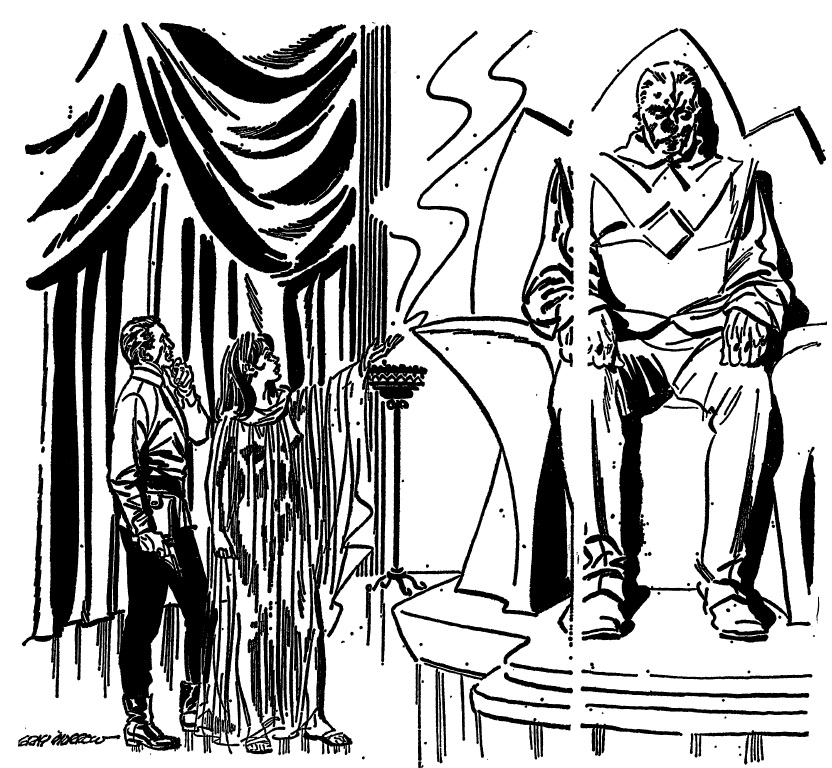
by Gray Morrow
The saving grace of this magazine is this final installment of Vance's latest serial. Keith Gersen has tracked down Viole Falushe, one of the five "Demon Kings" crime lords who killed his parents, to the mobster's private domain. The Palace of Love is a mystical retreat, designed to provide pleasure to discerning patrons. But its staff and denizens are all slaves of Falushe, though they aren't completely aware of the fact.
Half of this last act involves the long, meandering road to Falushe's Palace of Love. It is only in the final sixth that we learn the truth about the place, who Drusilla is and her relation to Falushe's object of childhood infatuation, Jheral Tinzy, and whether or not Gersen can succeed in his revenge.
I found it all gripping stuff. Vance has a knack for sensual writing; you always know what things smell like, what color they are, how they sound. Yet the prose is never overlabored. If the first book in the series starts auspiciously and ends with a dull thud, this second one only has one slow patch, in its second sixth.
For that reason, I give this installment and the book as a whole four stars, and it'll be in the running for the Galactic Star at the end of the year.
Summing up
Even with Palace shoring things up, this month's Galaxy clocks in at a dismal 2.4 stars. And given that the Vance is likely to end up published in paperback, it's probably not even worth buying this mag for the one story (unless, of course, you want the serial complete in original form).
I'll be surprised if Galaxy doesn't come in last this month. I'll also be really disappointed in that event; I don't think I could easily face another, worse slog!
That would truly be the ugliest month I've ever seen…

![[January 10, 1967] Return to sender (February 1967 <i>Galaxy</i>)](https://galacticjourney.org/wp-content/uploads/2022/01/670110cover-672x372.jpg)

![[January 8, 1967] So-So Historical, Delightful Doctor (<i>Doctor Who</i>: The Highlanders)](https://galacticjourney.org/wp-content/uploads/2022/01/660108nicehat-672x372.jpg)

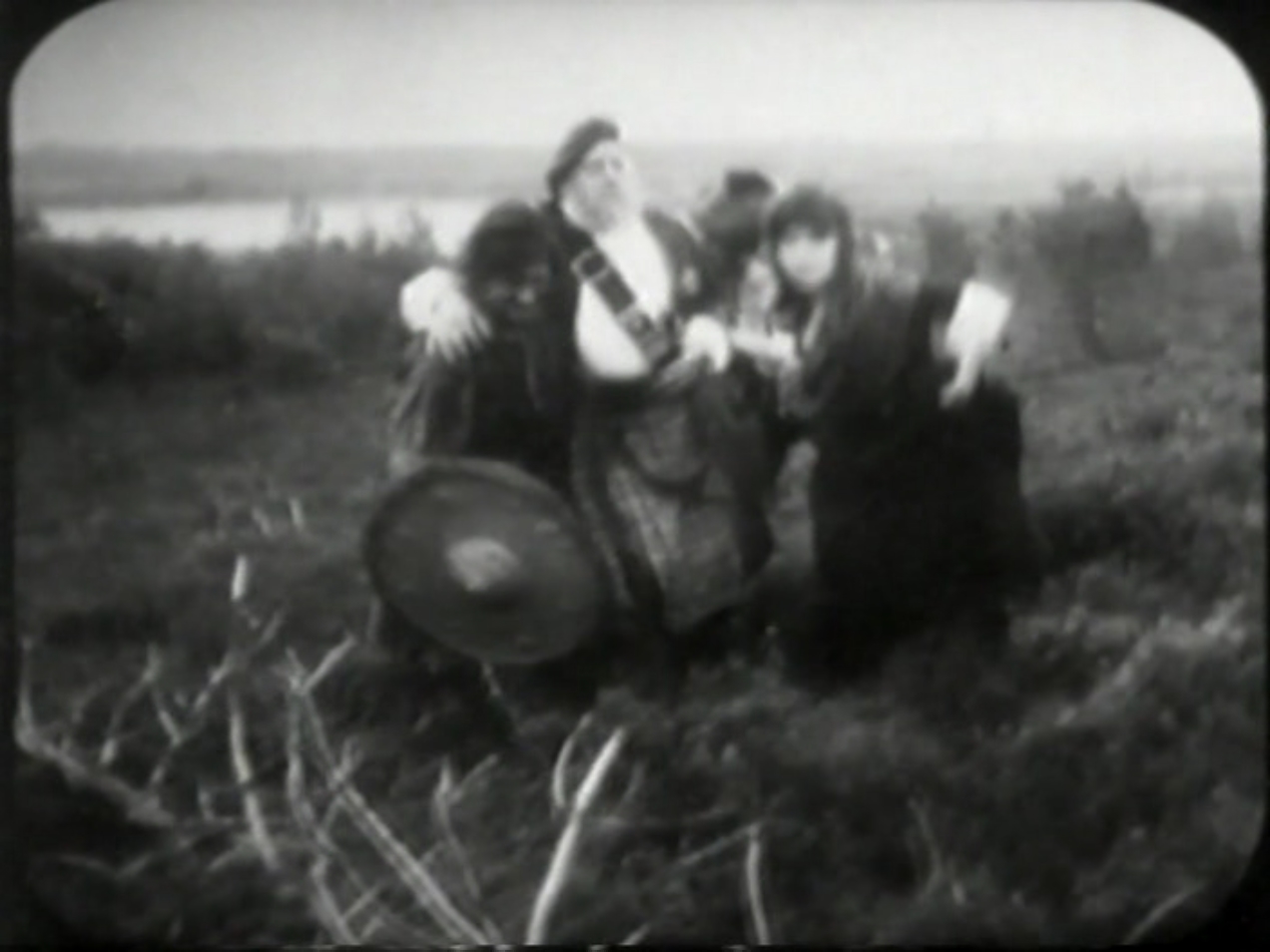
![[January 6, 1967] Happy Anniversary (February 1967 <i>Amazing</i>)](https://galacticjourney.org/wp-content/uploads/2022/01/amz-0267-cover-465x372.png)

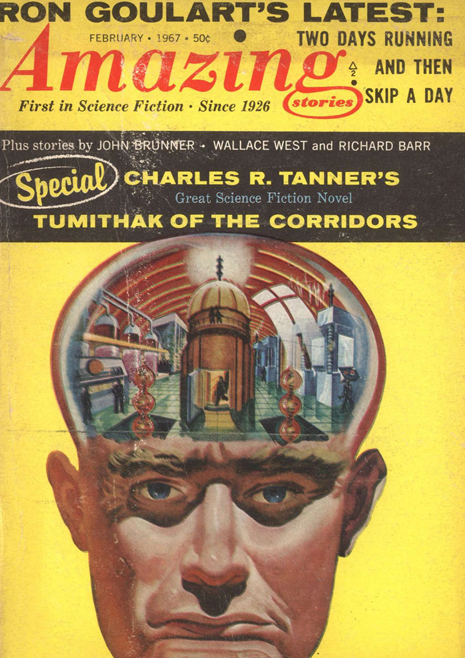

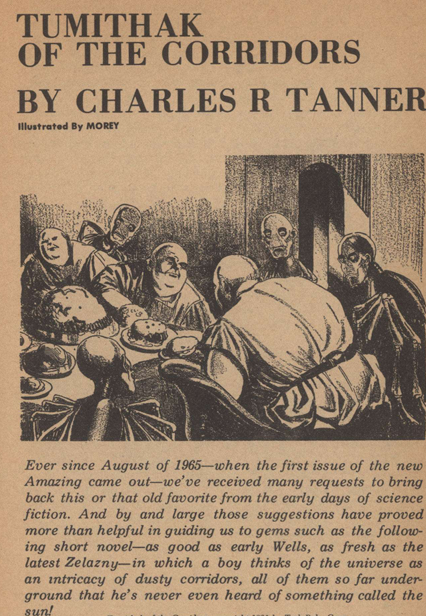




![[January 4, 1967] Six Impossible Things Before Breakfast (<i>Star Trek</i>: Shore Leave)](https://galacticjourney.org/wp-content/uploads/2022/01/670104title-672x372.jpg)












![[January 2, 1967] Different perspectives (February 1967 <i>IF</i>)](https://galacticjourney.org/wp-content/uploads/2021/12/IF-Cover-1967-01-672x372.jpg)


